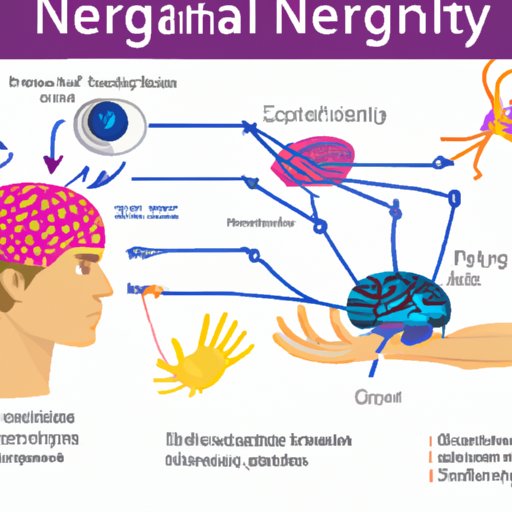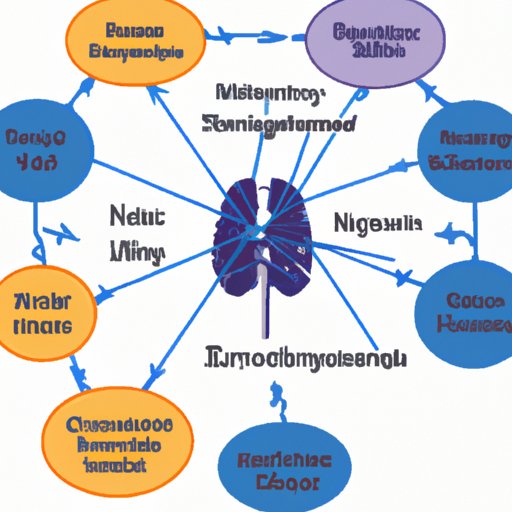Introduction
The human body is made up of a complex network of systems that work together to keep us healthy and functioning. The nervous system plays an integral role in this network, as it is responsible for transmitting signals from the brain to the rest of the body. In this way, the nervous system acts as the central hub for inter-systemic communication. This article will explore how the nervous system works with other systems in the body, including the endocrine and cognitive systems.
Exploring the Role of the Nervous System in Inter-Systemic Communication
In order to understand how the nervous system works with other systems in the body, it is important to first understand the anatomy and physiology of the nervous system. The nervous system is composed of neurons, cells that transmit electrical signals throughout the body. There are two main types of neurons: sensory neurons, which detect changes in the environment and send signals to the brain; and motor neurons, which receive signals from the brain and cause muscles to contract.
The nervous system also relies on neurotransmitters, chemicals that allow neurons to communicate with each other. Neurotransmitters are released by neurons when they are stimulated, allowing them to pass messages along to other neurons. This process of inter-systemic communication is essential for the functioning of the nervous system and other systems in the body.

Examining the Effects of Stress on the Nervous System and Other Systems
Stress is an unavoidable part of life, but it can have a significant impact on both the nervous system and other systems in the body. When we experience stress, the body releases hormones such as cortisol and adrenaline, which can affect the functioning of the nervous system. For example, these hormones can increase heart rate and blood pressure, which can lead to headaches, dizziness, and difficulty concentrating.
Stress can also have an effect on other systems in the body. For example, it can weaken the immune system, making us more susceptible to infections and illnesses. It can also lead to digestive problems, insomnia, and depression. In addition, long-term stress can increase the risk of developing chronic health conditions such as heart disease and stroke.
Investigating the Interaction Between the Nervous System and the Endocrine System
The endocrine system is another important system in the body that interacts with the nervous system. The endocrine system is composed of glands that produce hormones, which are chemicals that regulate various processes in the body, such as growth and metabolism. Hormones produced by the endocrine system can also affect the functioning of the nervous system.
For example, the hormone epinephrine, which is released in response to stress, can affect the transmission of signals in the nervous system. In addition, hormones such as serotonin and dopamine can affect mood and behavior, which is regulated by the nervous system. Thus, the endocrine system and the nervous system interact to maintain homeostasis in the body.

Understanding How the Nervous System Influences Cognitive Functioning
Cognitive functioning refers to our ability to think, reason, remember, and learn. The nervous system plays an important role in cognitive functioning, as it is responsible for sending and receiving signals from the brain. Neurotransmitters such as dopamine and norepinephrine are released in response to stimuli, and can affect memory, attention, and learning.
Studies have shown that damage to the nervous system can impair cognitive functioning. For example, a study published in Neurology found that people with Parkinson’s disease, which is caused by damage to the nervous system, had difficulty with short-term memory, decision-making, and problem-solving. These findings demonstrate the importance of the nervous system in maintaining cognitive functioning.
Conclusion
This article has explored how the nervous system works with other systems in the body. We have examined the anatomy and physiology of the nervous system, the effects of stress on the nervous system and other systems, the interaction between the nervous system and the endocrine system, and how the nervous system influences cognitive functioning. It is clear that the nervous system plays an important role in inter-systemic communication and maintaining homeostasis in the body.
The nervous system is a complex and fascinating system, and further research is needed to better understand its role in the body. By understanding how the nervous system works with other systems, we can develop better treatments for conditions that affect the nervous system and other systems in the body.
Final Thoughts
The nervous system is an integral part of the human body, and it plays a vital role in inter-systemic communication. Understanding how the nervous system works with other systems can help us better understand and treat a variety of conditions that affect the body. The more we know about the nervous system, the better equipped we will be to maintain our health and wellbeing.
(Note: Is this article not meeting your expectations? Do you have knowledge or insights to share? Unlock new opportunities and expand your reach by joining our authors team. Click Registration to join us and share your expertise with our readers.)
